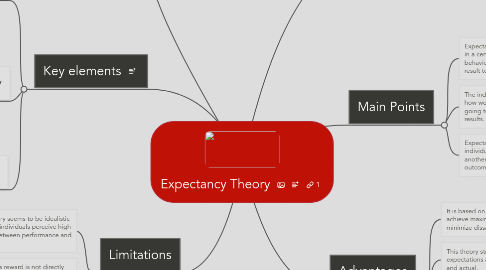Expectancy Theory
by Stephen Tran

1. Questions to ask
1.1. Will putting effort into the task lead to the desired performance?
1.2. Will high performance lead to the desired outcome?
1.3. Are the available outcomes highly valued?
2. Key elements
2.1. Expectancy
2.1.1. E > P (Effort-Performance)
2.1.2. Probability that putting effort into a task will lead to high performace
2.1.3. The individual must have the ability, experience and necessary tools to perform well.
2.2. Instrumentality
2.2.1. P > O (Performance-Outcome)
2.2.2. Whether successful performance will lead to the desired outcome
2.2.3. The individual must be highly motivated to perform well.
2.3. Valence
2.3.1. Value of outcomes (pay, recognition, other rewards)
2.3.2. Example: Salary increases, promotion, peer acceptance, recognition by supervisors, might have more or less value to individual employees.
3. Limitations
3.1. The expectancy theory seems to be idealistic because quite a few individuals perceive high degree correlation between performance and rewards.
3.2. The application of this theory is limited as reward is not directly correlated with performance in many organizations. It is related to other parameters also such as position, effort, responsibility, education, etc.
4. Motivation
4.1. Motivation = Expectancy x Instrumentality x Valence
4.2. Motivation can be described as the natural drive that pushes people to do what they do, either consciously, or subconsciously.
4.3. Leaders enhance motivation by increasing followers' expectancy which would be clarifying individual needs, providing desired outcomes, and ensuring that individuals have the ability and support needed to perform well and attain their desired outcomes.
5. Main Points
5.1. Expectancy theory proposes that a person will decide to act in a certain way because they are motivated to select a behavior over other behaviors due to what they expect the result to be.
5.2. The individual makes choices based on estimates of how well the expected results of a given behavior are going to match up with or eventually lead to the desired results.
5.3. Expectancy theory explains the behavioral process of why individuals are motivated to choose one behavioral option over another. It also explains how they make decisions to achieve the outcome that they perceive as most valuable.
6. Advantages
6.1. It is based on self-interest individual who want to achieve maximum satisfaction and who wants to minimize dissatisfaction.
6.2. This theory stresses upon the expectations and perception; what is real and actual.
6.3. It emphasizes on rewards or pay-offs.
6.4. It focuses on psychological extravagance where final objective of individual is to attain maximum pleasure and least pain.


